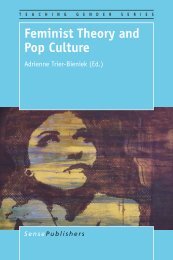1177-threshold-concepts-and-transformational-learning
1177-threshold-concepts-and-transformational-learning
1177-threshold-concepts-and-transformational-learning
- No tags were found...
Create successful ePaper yourself
Turn your PDF publications into a flip-book with our unique Google optimized e-Paper software.
SCHWARTZMANScholarship in liminality to this point has taken the form variously of description,metaphor, <strong>and</strong> analogy. Meyer <strong>and</strong> L<strong>and</strong> construe approaches to teaching withinthe TC framework as entirely discipline-specific, <strong>and</strong> have eschewed those thattranscend disciplinary boundaries.BackgroundUnderlying Premises. This paper is predicated on two premises: 1) Crucial elementsof student experience of difficulty as they encounter existentially unfamiliar,educationally critical content of their respective disciplines occur in commonacross all disciplinary contexts; <strong>and</strong> 2) These crucial elements constitute core issuesdefining TC. I agree with Meyer <strong>and</strong> L<strong>and</strong> regarding the importance of liminality,but diverge from their dismissal of scholarship transcending disciplinary boundaries.Faculty at TC conferences invariably recognize in each others’ descriptions ofstudent behavior – either at formal presentations or in informal conversations, <strong>and</strong>irrespective of discipline – depictions of their own students’ response to encounterswith deeply challenging content. Their consistent mutual recognition makes a strongcase that the significance <strong>and</strong> potential of TC as an analytic framework derivesfrom the universality of student experiences of difficulty in encounters with thatcontent in any – <strong>and</strong> all – of their respective fields. One may conclude that, withrespect to the nature of the learner’s experience of difficulties in encountering –<strong>and</strong> the mechanism involved in her / his <strong>learning</strong> – deeply challenging content, manymore elements of commonality than difference hold across disciplinary boundaries.Certainly the specifics of <strong>learning</strong> deeply challenging, educationally criticalcontent of a discipline (tc’s) must be addressed within their respective disciplinarycontexts. However, the very notion that liminality will likely be experienced bystudents in any (<strong>and</strong> every) field indicates that crucial elements of that experience –which constitute core issues defining TC – are unrelated to disciplinary context.This paper is motivated by an interest in developing TC scholarship of liminalitybeyond its current forms (description, analogy, <strong>and</strong> metaphor) to explanation. I arguethat doing so requires a theoretical foundation through which these core issues canbe investigated <strong>and</strong> understood independent of disciplinary context.The argument is based in phenomenological analysis (not psychology orsituational dynamics), according to which: student experiences of difficulty underthese circumstances are considered to be founded in reflective <strong>and</strong> defensiveresponses to rupture in knowing, a universal human pattern of encounter <strong>and</strong>response to the existentially unfamiliar (what appears initially as the unknowableunknown), rather than to result from individual inadequacies or to differ in kindaccording to the context in which it occurs. I propose the constructs of reflective<strong>and</strong> defensive responses to rupture in knowing as a discipline-independenttheoretical foundation for TC.Origins. The proposal grows out of an exploration of student encounters withthe existentially unfamiliar, educationally critical content of computing science(my discipline), where such a framework has proved relevant <strong>and</strong> illuminating.22




